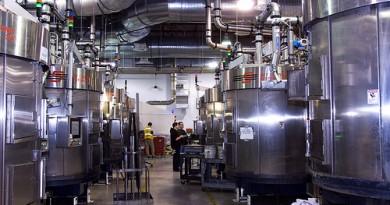Cornell to Head the $5M Federal Cloud Computing Program
Cornell will lead a 5 year, $5 million project sponsored by the National Science Foundation, to develop a federated-cloud system known as the Aristotle Cloud Federation, according to the Center for Advanced Computing.
“The goal of Aristotle is to reduce the time to science for researchers,” said David Lifka, the director of the Center for Advanced Computing and one of the principal investigators for the Aristotle project.
Cloud computing is a system of computing that allows users to store and process data in third-party, internet-based data centers, enabling them to access shared resources and information on demand. According to Lifka, Aristotle will make this technology even more robust.
“Rather than wait for resource availability locally, researchers can get their work done faster by sharing resources across institutional boundaries,” Lifka said.
Lifka is partnered with co-principal investigators Lifka is partnering with co-principal investigators Dr. Tom Furlani, Director of the University of Buffalo Center for Computational Research, and Dr. Rich Wolski, a professor of computer science at the University of California, Santa Barbara, both of whom he has been collaborating with for several years.
There are seven project teams outlined in the NSF proposal, which were chosen for “the diversity of their data analysis requirements and cloud usage modalities,” according to a statement from the Center for Advanced Computing. Four of these projects include Cornell faculty.
“Initially we will focus on supporting these groups and hope to both support additional groups and perhaps federation partners over the course of the five year award,” Lifka said.
The Center for Advanced Computing administers Red Cloud, a hybrid-cloud system available to the entire university research community. Users with access to a hybrid-cloud can install their own virtual machines, “which are essentially operating systems and software that can share physical computers, storage and networks,” Lifka said.
The economic goal behind this model is to only buy enough computing equipment that a user community can keep busy, because idle equipment loses value quickly, according to Lifka. However he said such a tight supply can sometimes lead to bottlenecking.
“At times the local cloud resources won’t be sufficient to meet demand,” Lifka said.
Public clouds, such as Amazon Web Services, can host a user’s virtual machines and data, but are typically more expensive.
Cornell’s Working Strategy
In a Federated Cloud model such as Aristotle’s, users can transfer their virtual machines and data to a collaborating institution’s resources instead of paying for access to a public cloud provider.
The initial phase of the federation is expected to go into production this coming January, according to Lifka. While all of the local cloud resources that will participate in the federation are already running, the NSF grant will provide each institution with more servers and storage resources, and work is underway to train the research groups in utilizing the federation resources.
“As required by this award, all software, tools, documentation and training materials we create to build this federated cloud will be made publically available to the national community so they can join this federation or create their own,” he said.
Currently, anyone can subscribe to use Cornell’s Red Cloud, and these users will eventually gain access federation resources. Moreover, the Aristotle team aspires to introduce this innovation to the broader research community.
“It is our hope and that of NSF’s that this will serve as a model that the national research community can adopt and enhance over time, making more computing and data analysis resources available in a very scalable and sustainable way,” Lifka said.
Paul Redfern, CAC assistant director of strategic partnerships, chose the name, invoking the philosopher who once declared that, “the whole is greater than the sum of its parts.”
“This is exactly what our Aristotle Cloud Federation is designed to provide,” Lifka said.
Source: http://cornellsun.com/2015/11/04/cornell-to-lead-5m-federal-cloud-computing-program/



